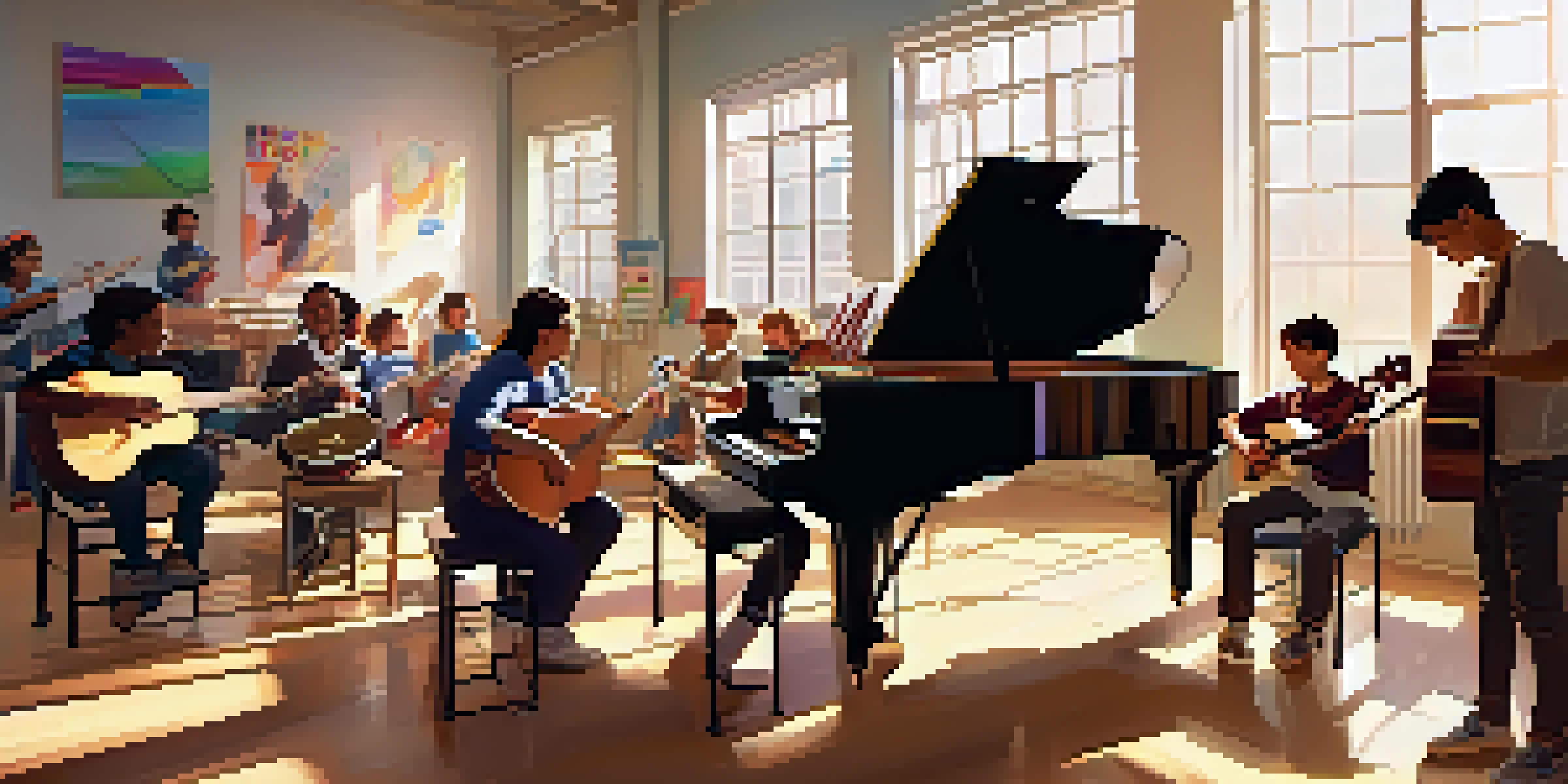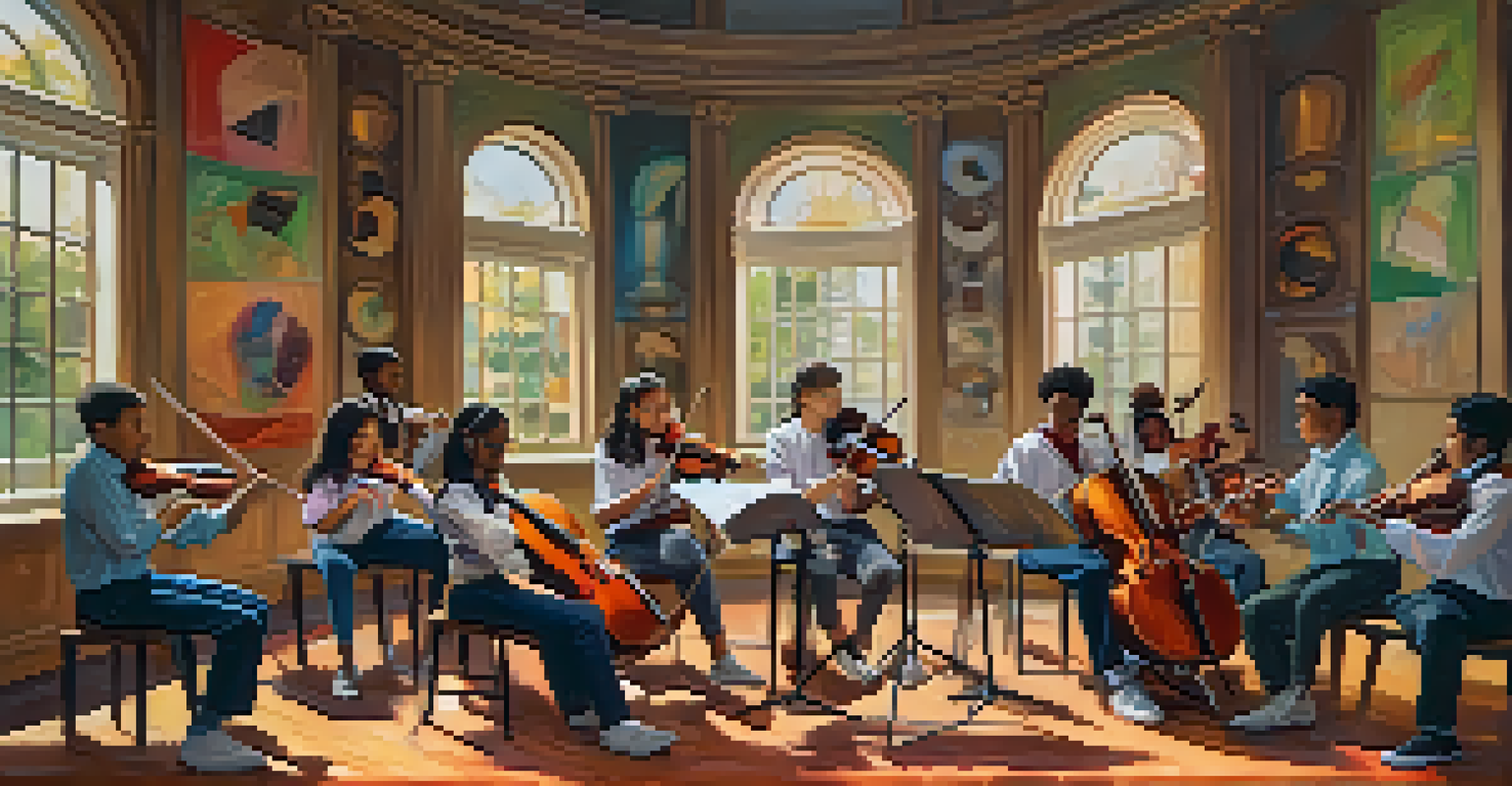The Role of Music Education in Building Resilience in Students

Understanding Resilience and Its Importance
Resilience is the ability to bounce back from challenges, and it's crucial for students as they navigate academic pressures and personal struggles. It helps them adapt to setbacks and maintain a positive outlook. In a world that often feels overwhelming, teaching resilience can empower students to face difficulties head-on, making it an essential skill for life.
Resilience is not a single trait, but rather a combination of skills and attitudes that can be cultivated over time.
When students develop resilience, they learn to view challenges as opportunities for growth rather than obstacles. This mindset shift encourages them to embrace learning, even when things get tough. Essentially, resilience transforms the way they approach both failure and success, allowing them to persevere through life's ups and downs.
Music education plays a significant role in cultivating this resilience. Through learning an instrument or participating in a choir, students face the inevitable challenges of mastering new skills. This process teaches them that perseverance and practice can lead to improvement, reinforcing the idea that effort truly pays off.
The Connection Between Music and Emotional Expression
Music serves as a powerful outlet for emotional expression, providing students a safe space to channel their feelings. Whether they are composing a piece or performing, students can articulate their emotions in ways that words sometimes fail to capture. This ability to express oneself is a critical component of emotional resilience.

In times of stress or emotional turmoil, engaging with music can offer comfort and relief. Students who participate in music education often report feeling more connected to their emotions, allowing them to process their experiences more effectively. This connection can be particularly beneficial during challenging times, helping students manage anxiety and stress.
Resilience Through Music Education
Music education fosters resilience by teaching students to view challenges as growth opportunities and encouraging perseverance.
Moreover, music encourages empathy, as students learn to understand and appreciate different perspectives through various genres and styles. This sense of empathy fosters a supportive community, further enhancing their emotional resilience. By learning to connect with others through music, students build meaningful relationships that can help them navigate life's challenges.
Building Discipline and Commitment Through Music
Learning music requires a level of discipline that is valuable across all areas of life. Students must dedicate time to practice, set goals, and work steadily toward improvement. This commitment teaches them the importance of consistency and hard work, skills that are essential for overcoming obstacles in their academic and personal lives.
Music can change the world because it can change people.
As students progress in their musical journey, they experience the rewards of their efforts firsthand. They learn that success doesn’t come overnight but is a result of persistent dedication. This realization can boost their self-esteem and reinforce the idea that they are capable of achieving their goals, no matter how daunting they may seem.
Moreover, the structure of music education often involves setting short-term and long-term goals, which mirrors the processes found in other disciplines. This goal-oriented approach helps students to develop a resilient mindset, learning to celebrate small victories along the way. Each milestone reached in music becomes a testament to their ability to persevere.
Teamwork and Collaboration in Music Education
Many aspects of music education involve teamwork and collaboration, whether through band, choir, or group projects. These collaborative experiences teach students how to work together toward a common goal, fostering a sense of community and belonging. This social interaction is vital for building resilience, as students learn to rely on and support one another.
Through collaboration, students also develop essential communication skills. They learn to express their ideas and listen to others, which can lead to more effective problem-solving. This ability to navigate group dynamics helps them become adaptable and resilient, skills they can apply in various settings beyond the music classroom.
Emotional Expression and Support
Engaging with music provides students a safe space for emotional expression, enhancing their emotional resilience and fostering empathy.
Additionally, facing the challenges of group performances—such as synchronizing with others or handling mistakes—teaches students how to manage pressure. They discover that setbacks are part of the process and that they can rely on their peers for support. This camaraderie not only strengthens their resilience but also creates lasting friendships.
Enhancing Cognitive Skills Through Music Education
Engaging in music education has been shown to enhance cognitive skills, which are crucial for academic success and resilience. Students who study music often exhibit improved memory, attention, and problem-solving abilities. These skills contribute to their overall capacity to face and overcome challenges in other subjects and areas of their lives.
The mental engagement required in music—such as reading sheet music, coordinating rhythm, and understanding musical theory—stimulates brain development. This cognitive boost can result in greater academic performance and a more profound understanding of complex concepts. When students feel academically capable, their resilience in facing setbacks naturally strengthens.
Moreover, music education encourages creative thinking and innovation. When students learn to improvise or compose, they push the boundaries of traditional thinking. This creative mindset fosters resilience, allowing them to approach problems from various angles and find solutions, even when faced with adversity.
The Role of Music in Stress Relief and Well-Being
Music has long been recognized for its therapeutic benefits, acting as a form of stress relief for many students. Engaging with music—whether through playing an instrument, singing, or listening—can reduce anxiety and promote relaxation. This aspect of music education is vital for building resilience, as it provides students with tools to manage stress effectively.
Incorporating music into daily routines can offer students a much-needed break from academic pressures. It allows them to unwind, recharge, and refocus, which is essential for maintaining mental health. When students have healthy coping mechanisms, they are better equipped to handle challenges and setbacks.
Discipline and Lifelong Learning
The discipline required in music education cultivates commitment and a love for learning, essential components for developing resilience.
Furthermore, the joy and fulfillment derived from music can enhance overall well-being. Students who find happiness in their musical pursuits are often more resilient, as they recognize the importance of self-care. This positive emotional outlet can make a significant difference in how they approach life's difficulties.
Encouraging a Lifelong Love for Learning Through Music
Music education instills a love for learning that extends beyond the classroom. When students engage with music, they discover the joy of exploring new concepts, styles, and cultures. This enthusiasm for learning can foster a resilient attitude, as students become more open to new experiences and challenges.
As students progress in their musical education, they often seek out additional opportunities to learn and grow. This curiosity drives them to explore various interests, which can lead to a more well-rounded and adaptable mindset. Embracing lifelong learning is a key component of resilience, as it encourages students to continually evolve and face new challenges with confidence.

Additionally, a passion for music can inspire students to pursue their interests and goals outside of traditional educational settings. This drive fosters a sense of agency and empowerment, allowing them to take control of their own learning and resilience journey. By nurturing this love for music, we can help students build the foundation for a resilient and fulfilling life.